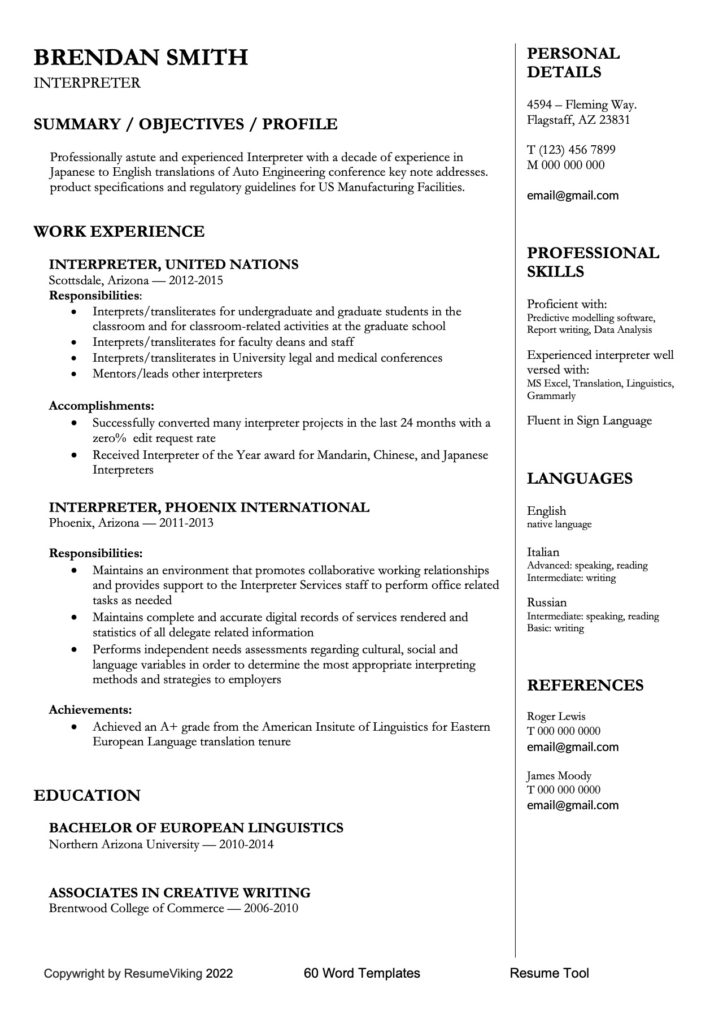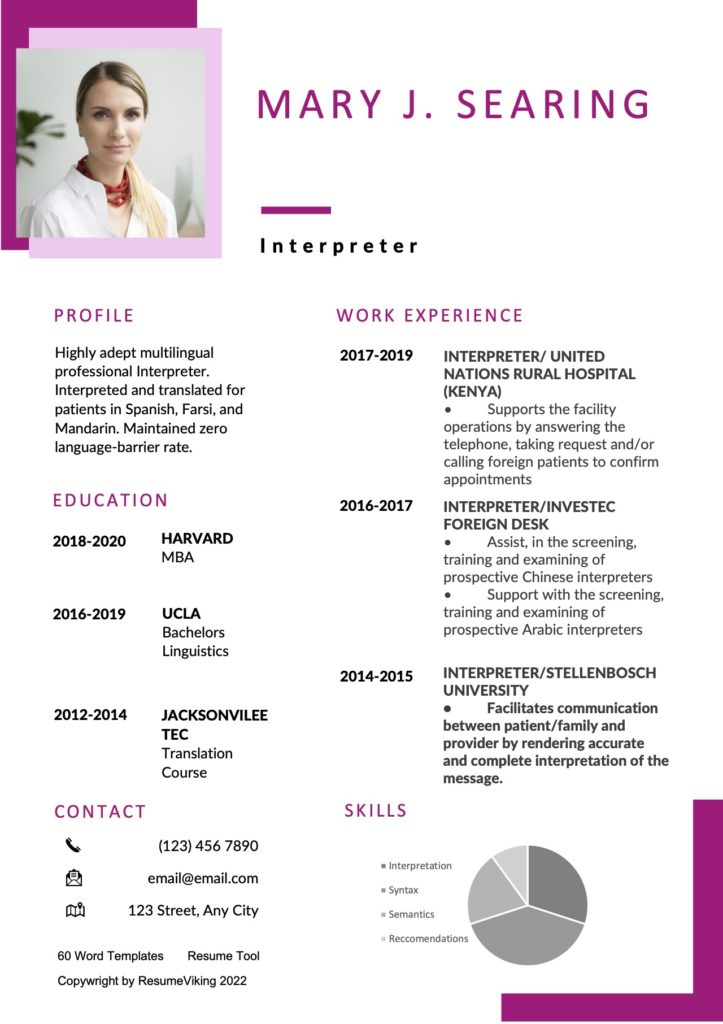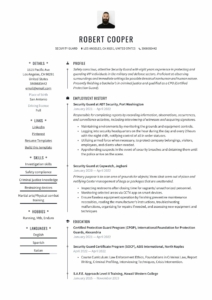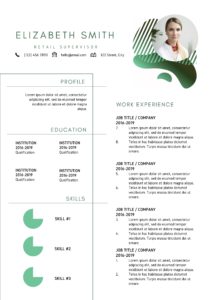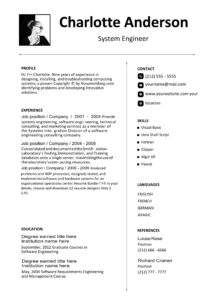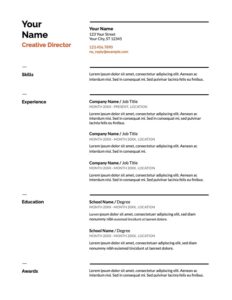Welcome to our “how-to” guide for your next Interpreter resume. It’s just common sense to look at a decent example of what it should look like, right? We have laid out all the info, tips, and examples you’ll need to create a smashing resume specifically designed for your job.
What you can read in this article
18 Interpreter Resume Examples
(Free sample downloads are at the bottom of this page)
Interpreter Resume Writing Guide
Resume Sections:
- Contact information
- Profile Summary
- Work History
- Achievements
- Education
- Skill Section
- Certification & Licensing
- Extras: Languages/Awards/Publications/Volunteering/hobbies
What to Highlight as an Interpreter
It doesn’t matter how crazy skilled you are at being a Jedi of the languages. Recruiters will expect to see specific critical features in your resume that highlight your capabilities.
Just something to keep in mind but remember the difference between interpreting and translating. Yes, they are linked, yes, but interpreters convert one language to another instantaneously, while translators work with the written word/ scripts after the speaking has been done.
Explain your industry expertise:
- Medical Interpreters: Professional medical interpreting entails familiar knowledge of medical terms and communicating medical concepts simply and clearly.
- Legal Interpreters: Legal interpreters may work in hearings, trials, and law offices at attorney-client meetings and depositions.
- Sign Language Interpreters: Sign language interpreters help communicate between people with standard hearing and those who are deaf/ hard-of-hearing.
- Conference Interpreters: Normally fluent in 2 or more languages, conference interpreters are highly proficient and usually are found at the United Nations doing instantaneous interpretation.
- Guide Interpreters: Also called escort interpreters, guide interpreters escort visitors to the U.S. to aid with communication.
The next point is crucial: You must include every language you are familiar with, having performed interpretation projects in those languages. We cannot stress enough that you must be specific here! You cannot just say, “I can interpret French, Russian, and English text.” You must explain what the original text was and to which language you translated it. Another good idea is listing the languages you can speak, and next to them gives your proficiency levels, such as Native Speaker, Fully Bilingual, Highly Adept, Competent, or Basic. Recruiters tend to prefer interpreters who can interpret more than one language into a native language like they do in the UN.
Lastly, Interpreters need to be proficient with tools, tech, and digital applications, like CAT (computer-assisted translation), Grammarly, and MemoQ. Include a list of all the tools you are familiar with and utilize daily in a Tools and Tech Matrix in your Key Skills section (We’ll expand on this later, though).
*Cool Tip for a stellar resume: If you want to make a solid first impression, provide a list of your top interpretation assignments that you consider most challenging/ prestigious (no more than ten though).
Career Summary, Objectives
We could argue this section is the make-or-break for your resume. It’s the first thing the recruiters/ research professionals/ academics see, and it gives them an idea as to whether or not they will continue reading your resume. It has to be punchy and perfect to make them want to read the rest in detail! So, how do you do this?
This is essentially a very short elevator pitch of yourself. Be concise, be brave, and you can definitely brag a little in good taste.
It works like this. If you have several years’ work experience in the industry, write a career summary. It must include:
- 1 or 2 adjectives (proficient, precise)
- Your title (Interpreter)
- Years’ experience (4+, 7+)
- Your goal (better communication and care)
- Proof of skills and quantification (assisted 4,800+ patients in 3 years)
Naturally, if you have no experience in the industry, you don’t have anything to summarize, do you? These people must write a career objective. It is also considered an elevator pitch, but it focuses more on skills, ambitions, and achievements from your other jobs.
An example would be interpreting for customers and staff when you worked in that restaurant.
The career summary/ objective should be no longer than 5-6 lines in total, explaining just how you’re the person for the job.
This is why the summary is vital and should be able to tell the recruiter in 2 seconds how perfect you are for the job, giving them justification to spend the next 6 seconds looking at the rest of your resume and potentially ending in your interview call!
*Pro Tip: Your resume should be no longer than one page unless you have worked longer than ten years, then you can stretch it a little bit.
Examples
Interpreter Summary 1
"Professionally astute and experienced Interpreter with a decade of experience in Japanese to English translations of Medical Engineering conference key, not addresses. Product specifications and regulatory guidelines for UK Engineering Facilities. A purist approach guarantees technical brilliance and proper context of written content, including numerical a mathematical calcs graphics, and report analysis. Completed a Masters in Medical Engineering, is a native Mandarni speaker, and currently pursuing a Masters in Advanced Linguistic THeories and Grammar Comprehension for Africam Languages."
Interpreter Summary 2
"Highly experienced and deadline-driven French-English Interpreter with five years’ experience in localizing French content for the UK commercial industry. Exposure to culinary, tourism, business, and hospitality-travel-based content includes websites, brochures, promotional materials, and scripting Spanish video content from Youtube, Dtube and Vimeo into English scripts and subtexts. Bilingual in five French dialects and a native English speaker. Holds a Masters Degree in Creative Writing, as well as a Masters in Business Management."
Interpreter Summary 3
"Highly adept multilingual professional Interpreted for patients in Spanish, Farsi, and Mandarin. Maintained zero language barrier rate, thanks to native-speaker-level grasp of all three languages and deep cultural competency. Commended by hospital administrators for efficiency and professionalism."
Interpreter Summary 4
"Efficient and accurate medical Interpreter with 24 years of experience. Skilled in Farsi, Spanish, Farsi, and healthcare terminology. Seeking to improve communication and care at various clinics in Mexico. Served 7,000+ patients in Spanish, Italian, Farsi, and Japanese in two years with zero language barrier issues. Commended by hospital administrators for professionalism and efficiency."
Employment History
Interpreters change the written text from the original language to the translated language, but they must guarantee that the original text's context and meaning are kept. The thing is, just because you’re a language worrier doesn’t ensure you a job. You must highlight certain experiences the job advert is asking for (we suggest using the exact words and phrases used in the advert). Recruiters will be looking for these experiences, and they may differ from job to job, so mold your resume to the job advert.
The aim here is to get the recruiter to say: “This applicant is worthy of an interview.” By writing up a solid experience section, you can do just that.
Follow these steps to create your experience section:
- Choose the appropriate title for your previous work experience. If they say they want a “medical interpreter” and you called yourself a “hospital interpreter,” it’s clearly the same line of work, so reword it the way they say it.
- Include several achievements that exhibit your skillset. For instance, if they need Korean and you have the experience, then include the fact that you “interpreted for 2,700+ patients in Korean.”
- Pro Tip: Words will be your best weapon here, so use the resume action verbs such interpreted, served, maintained, worked, commended, grew.
Examples:
Scientific Interpreter at the United Nations
(Jan 2019 – Jan 2022)
Developing technical sign materials, preparing for the classroom and other assignments, and sometimes responding to impromptu in various academic disciplines.
- Interpreting/ transliterating for graduates and undergraduates in the classroom and classroom-related tasks.
- Interpreting/ transliterating for staff and faculty.
- Interpreting/ transliterating within University medical and legal environments.
- Mentoring/ leading other interpreters.
Legal Interpreter at Toyota
(Jan 2015 – Dec 2018)
Accountable for answering requirements for interpretation throughout the Institute straightaway and efficiently, prioritizing emergencies and urgent requests.
- Maintaining a setting that endorses cooperative work relationships and provides assistance to the Interpreter Services staff to perform office-related tasks as required.
- Maintaining comprehensive and precise written records of stats for all patient-related information and services rendered.
- Performing independent needs assessment concerning language and cultural variables, determining the best interpreting methods/ strategies for employers.
Job Descriptions Examples
Below is a list of job descriptions to assist you with starting your list.
Sample Interpreter Duties:
- Participating inconsistent coaching and feedback sessions aimed at improving performance persistently.
- Performing other duties as allocated.
- Providing a professional level of customer service throughout interpreting sessions.
- Providing precise and comprehensive interpretation without paraphrasing.
- Acting professionally concerning conduct, appearance, and punctuality.
- Completing all compliance training and keeping all assignment-related information firmly private.
- Attending training sessions as planned.
- Render all messages precisely and absolutely, without improving, skipping, or substituting.
- Assisting with the screening, guidance, and testing of potential English interpreters.
- Attending staffing/ building conferences concerning certain students.
- Supporting office operations by answering the phone, taking requests, and/or calling clients to confirm appointments.
- Passing the Intermediate Interpretation performance test.
- Assisting with the screening, guidance, and testing of potential Spanish interpreters.
- Assisting with the screening, guidance, and testing of potential Arabic interpreters.
- Facilitating communication between patient/ family and medical provider by giving a precise and comprehensive interpretation of the message.
- Interpreting for tours, and responding to visitors’ questions.
- Providing extra info concerning the house and grounds, as required.
- Providing content to school group visits, teaching about Monroe and his period in history.
- Prior work experience intermingling with the public.
- Following interpreter quality standards created by TransPerfect Remote Interpreting Testing, Training, and Quality department.
- Expanding vocabulary and understanding of subject matter needed for various clients continuously.
- Developing techniques aimed at improving listening skills and short-term memory.
- Participating in skill development exercises.
- Maintaining ethical and professional standards relating to the position.
- Adhering to shifts as planned.
- Attending routine interpreter meetings.
Accomplishments
This is your time to shine right here! An Interpreter's resume without any accomplishment statements is sort of like a green chameleon in a green tree. It’s there, but you don’t really see it. You want to get the recruiter to read your whole resume because your achievements/ accolades got their attention from the start. This also allows you to stand apart from the competition.
We want you to think along the lines of CAUSE and EFFECT. Think about what you’ve done in previous jobs that made you really proud of your work. How did you manage to add a sense of value to the role? Give proven examples with every statement.
Basically, don’t just say, “I’m great at interpreting.” It would help if you quantified it with numerical values. Numbers serve both as proof of your statements and give recruiters a sense of your value to the team.
Examples of accomplishment statements without quantification:
- Effectively translated many interpreter projects with no edit request rate.
- Awarded Interpreter of the Year award for Mandarin and Korean Interpreters.
- Attained good grades from the American Institute of Linguistics for Eastern European Language translation expertise.
Here are some examples of quantified accomplishment statements:
- Effectively translated over 340 interpreter projects in the last 18 months with a 0-edit request rate.
- Awarded Interpreter of the Year award for Mandarin and Korean Interpreters out of 150 contestants.
- Attained an A+ grade from the American Institute of Linguistics for Eastern European Language translation expertise.
Education
Since translation is a specialized job, this section is essential for your chances of getting the interview call. Try and give as much info about your education, short of writing an essay. Below is an accepted format for laying out your education section:
Examples:
2013 – 2015 Ph.D. in Asian Linguistics, Northwestern University, New York, NY.
GPA: 4.1
Accolades: Completed Magna Cum Laude
2012- 2014 Master of Arts in Spanish Translation and Interpreting, Evanston, IL. Coursework: Advanced Linguistics, Spanish Phonetics, Business Spanish, Translation and Interpreting for Business, Spanish Composition.
2011- Certified Interpretive Host, National Association for Interpretation, Tampa, FL.
2010- 2012 Advanced Membership, American Translation Association (ATA), Alexandria, VA.
Skills
This section aims to prove to the recruiter that you have what it takes to do the job well. Your skills section must have hard skills (technical skills, language skills) and soft skills (personality traits)
Draw your skills up in a skills matrix, as shown below. Don’t use bullet points please, it’s boring, and you don’t have space. Make sure you look at the job advert and use the same keywords found in the advert on your resume.
Language Proficiency
| English (Canadian) | Native Proficiency (ILR 5, CEFR C2+, ACTFL Distinguished) |
| Spanish (Latin American) | Native Proficiency (ILR 5, CEFR C2+, ACTFL Distinguished) |
| Portuguese (Brazilian) | Limited Working Proficiency (ILR 2+, CEFR B2, ACTFL Advanced Mid) |
| German | Limited Working Proficiency (ILR 2, CEFR B1, ACTFL Intermediate High) |
| French | Elementary Proficiency (ILR 1+, CEFR A2, ACTFL Intermediate Mid) |
Technical Competencies
| Syntaxes | Word Processing Programs (CATS) | Spelling |
| Grammar Rules | Content Management Systems | Punctuation |
| Simultaneous Translation | Ace Interpreter | Editing |
| SDL Trados | MemoQ | Tenses |
| Speed Reading | Interpreting Information | Research |
| Excellent writing ability | Conversion of technical concepts | Linguistic continuities |
| Proofreading | Technical Terminologies | Grammar Structures |
Interpersonal Traits
| Cultural Awareness and Sensitivity | Communication Skills | Versatile |
| Analytical | Time Management | Multitasking |
| Adaptable | Responsible | Prioritization |
| Detail Orientated | Investigative | Independent Worker |
| Professional | Stress Tolerant | Accountable |
| Deadline Driven | Compliant | Trustworthy |
Qualifications & Certifications samples for Interpreters
| Defense Language Proficiency Test | American Interpreters Association | ATA-Certified Interpreter Seal |
| Interpreters Without Borders (TWB) | Certification in Linguistics | Certified Translator |
| International Federation of Interpreters (FIT) | American Literary Interpreters Association | Certified Interpreter |
| National Association of Judiciary Interpreters and Interpreters | National Association of the Deaf external site | Interpreters Guild of America |
Optional Extras for Interpreter Resumes
This section will help the recruiters get to know you as a person. Remember they want to hire a translator, not google translate, so show them your depth. It will help to set you apart from the other applicants.
Choose a few things from this list:
- Freelance work
- Activities
- Personal projects
- Associations like NAI
- Certifications like a CMI from NBCMI
- Volunteer experience
- Honors, awards
- Continuing education classes
- Conferences, particularly if you spoke at them
- Publications
- Exercise
- Commendations from superiors
- Professional Information for Interpreters
- Interests and hobbies
Interpreter Word Resume Download
Download Interpreter Templates in PDF
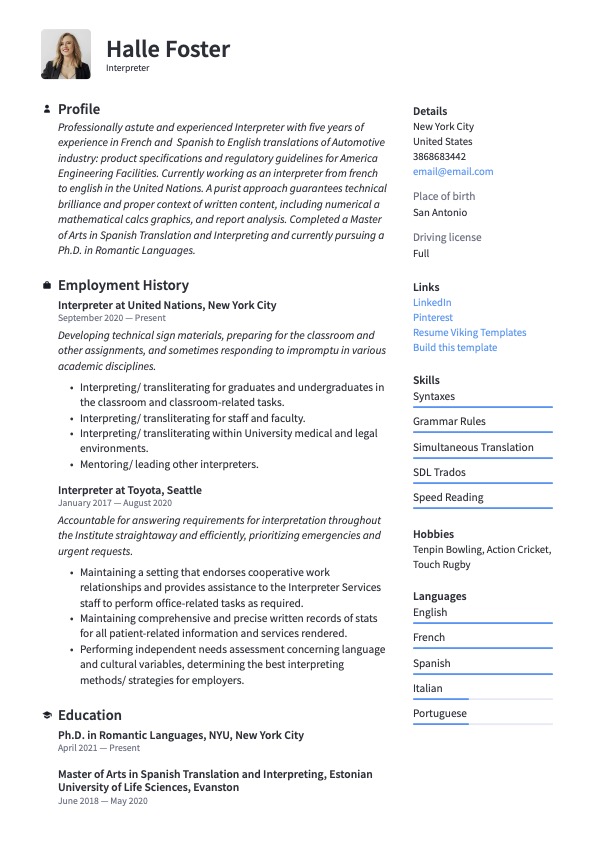
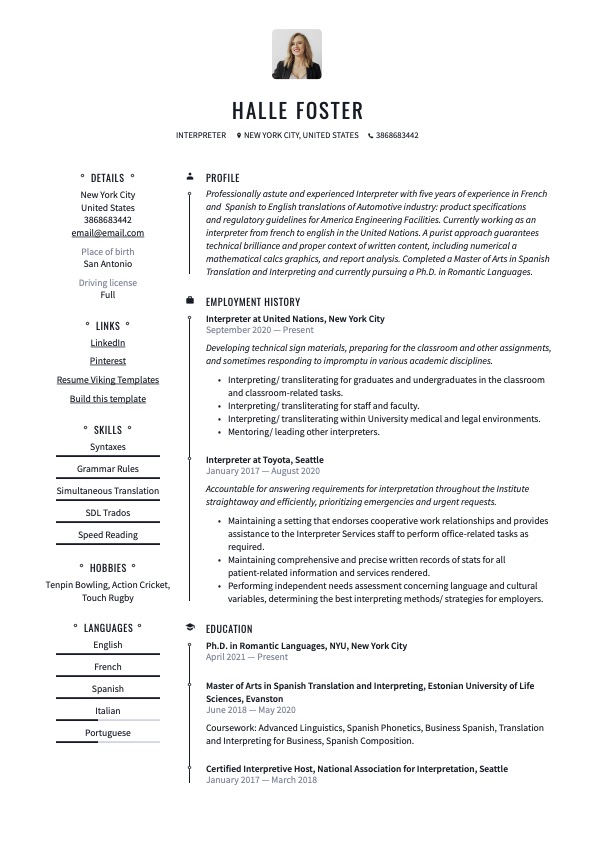
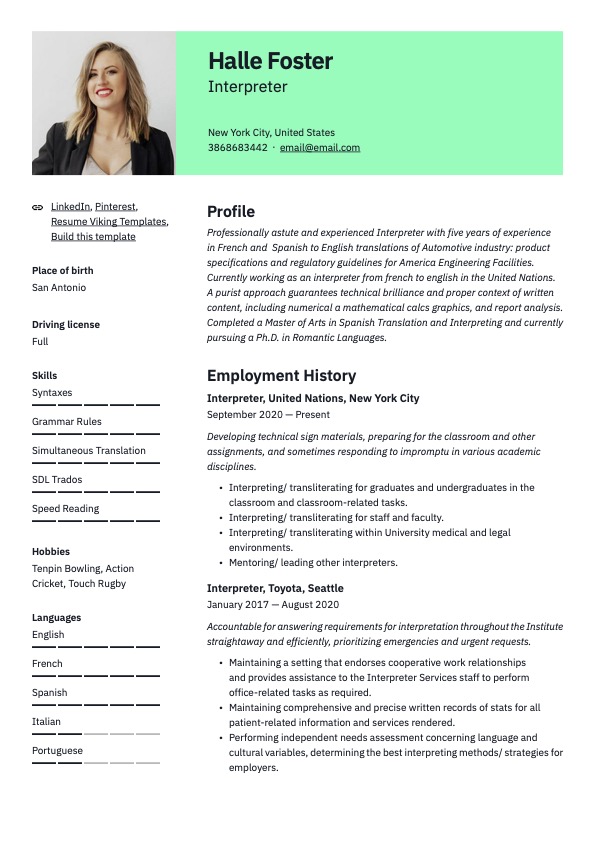
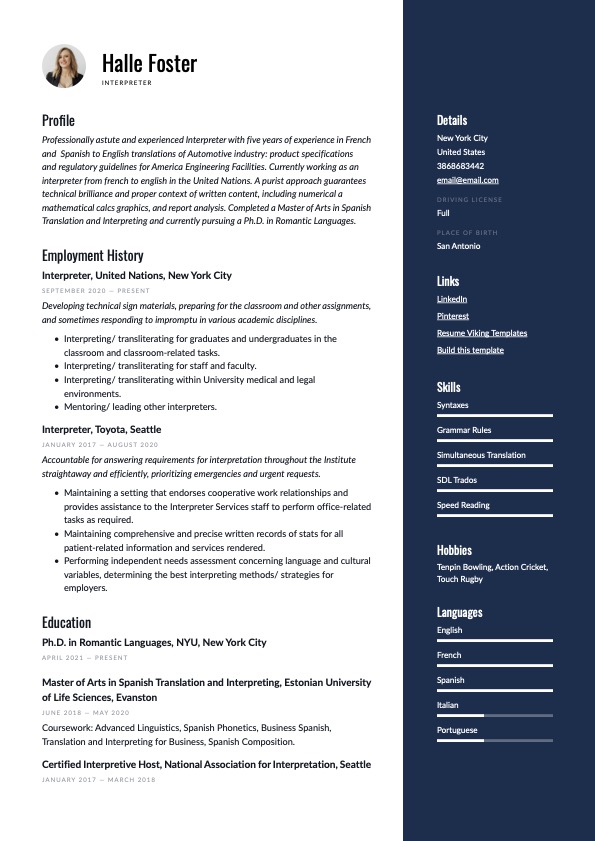
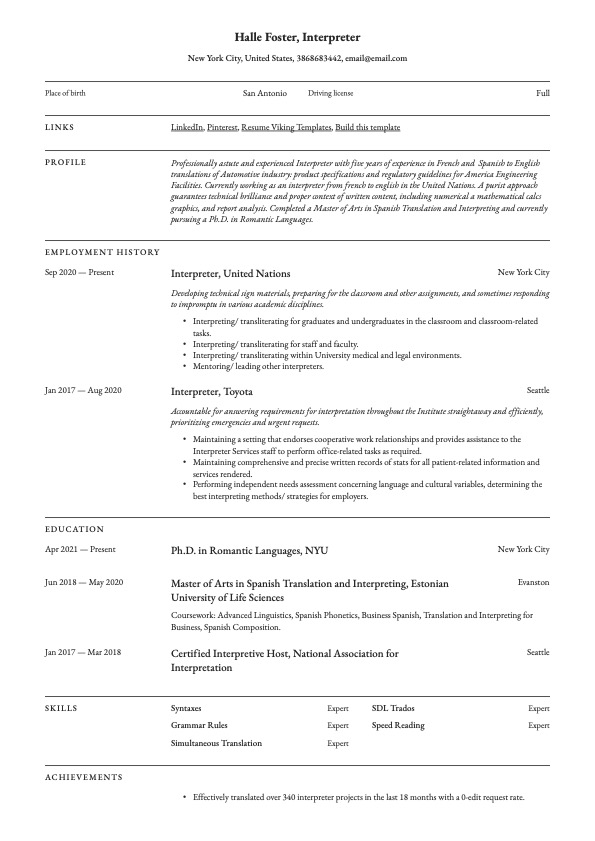
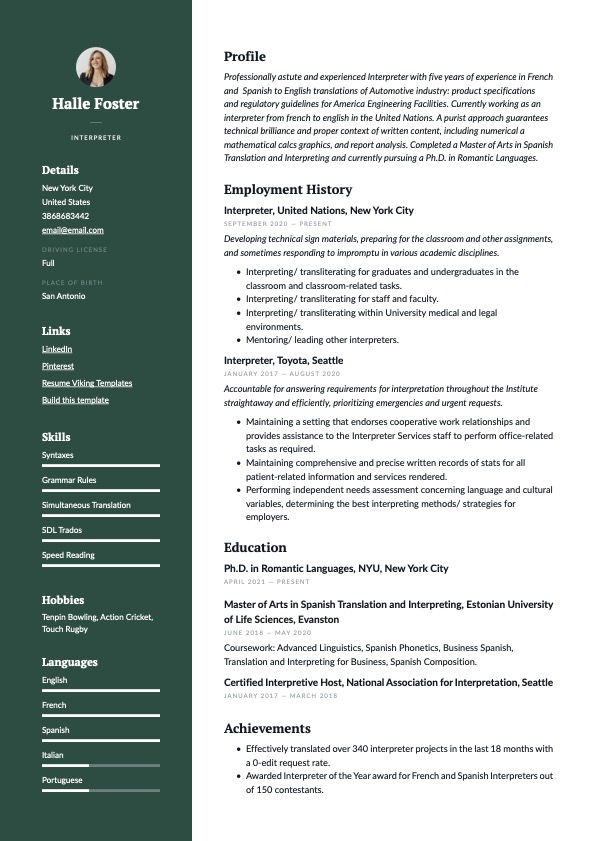
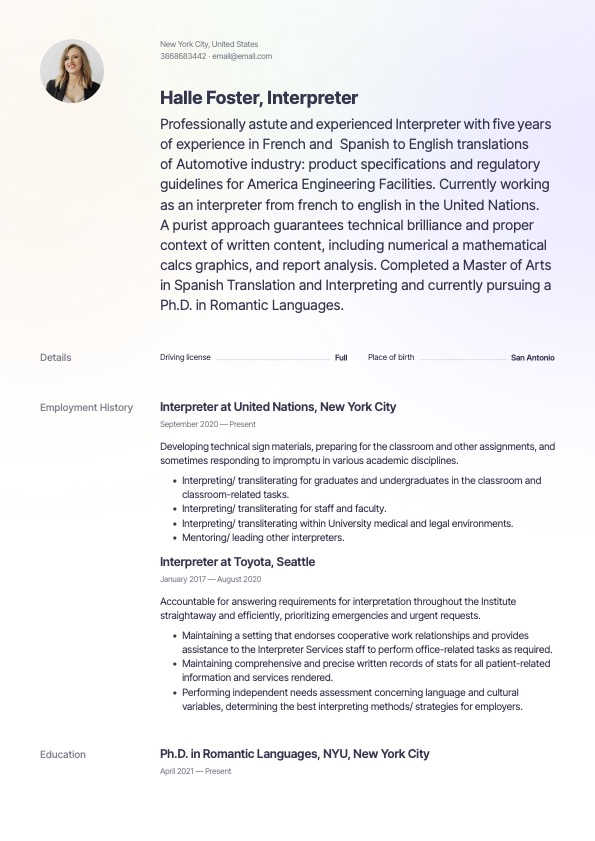
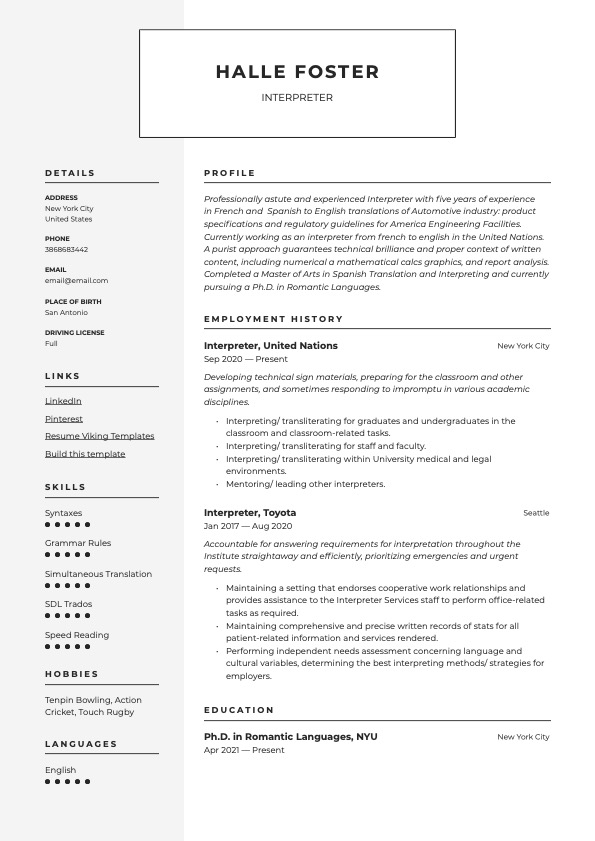
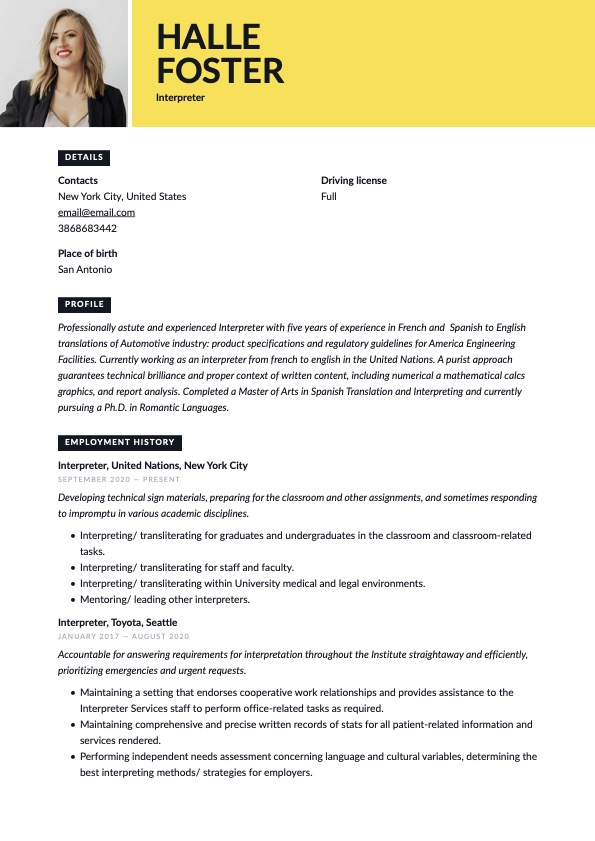
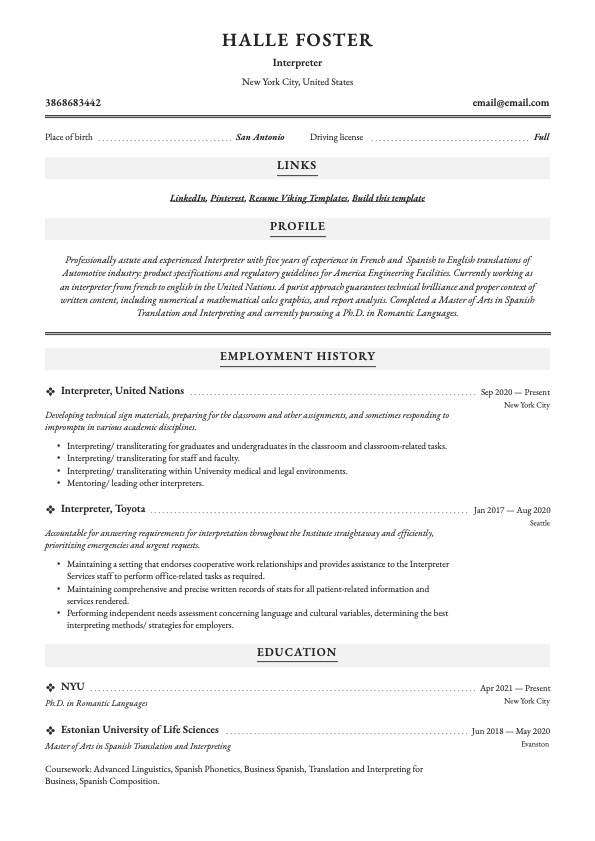
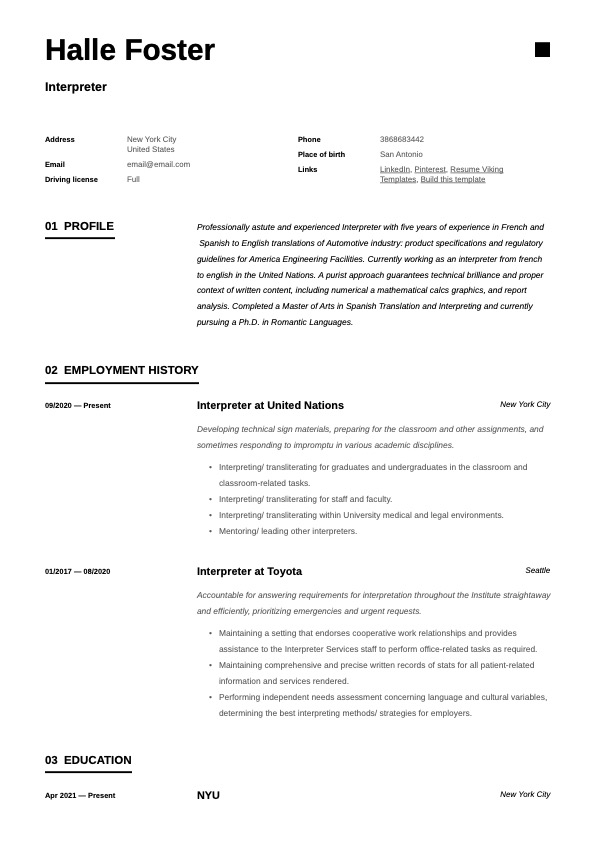
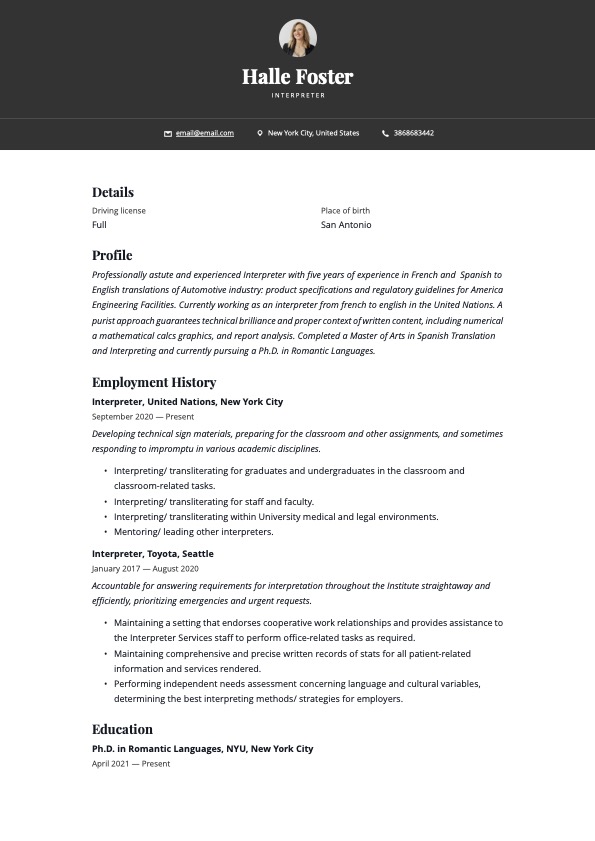
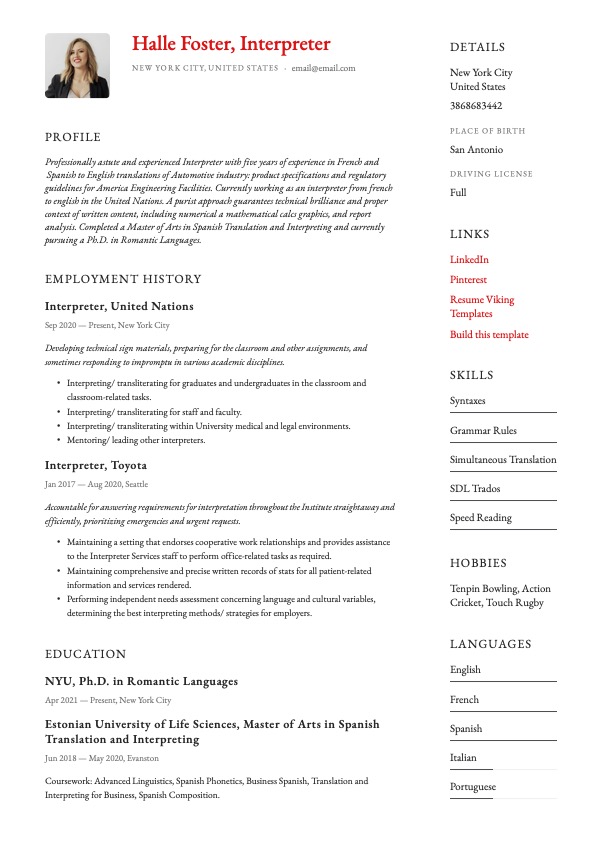
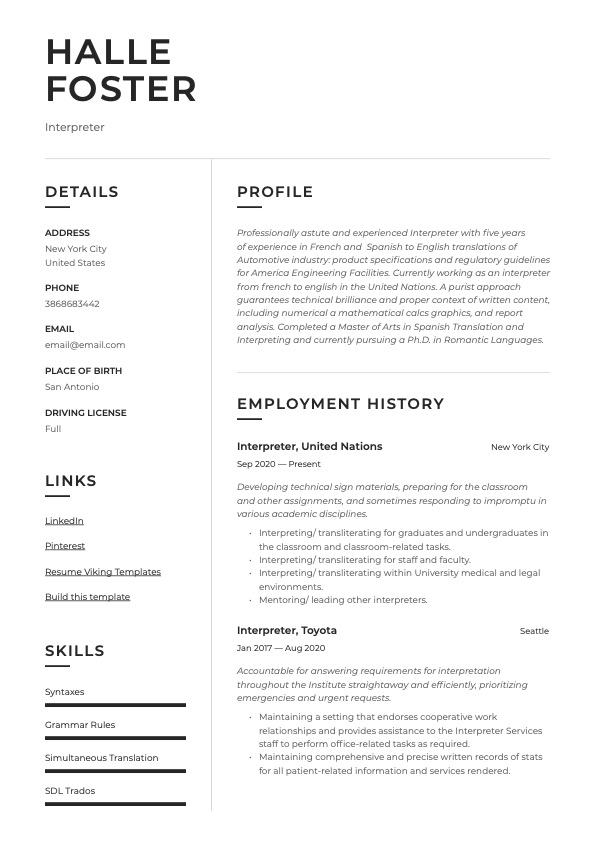
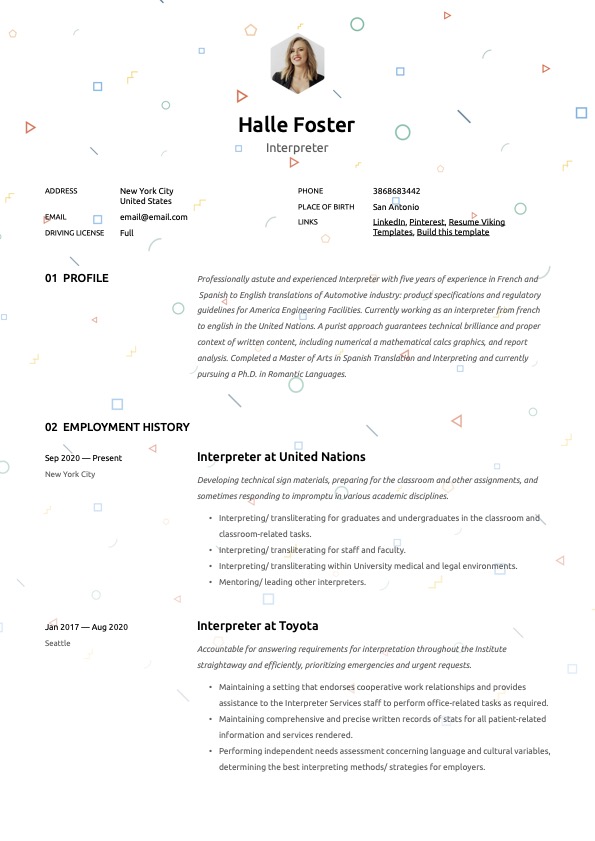
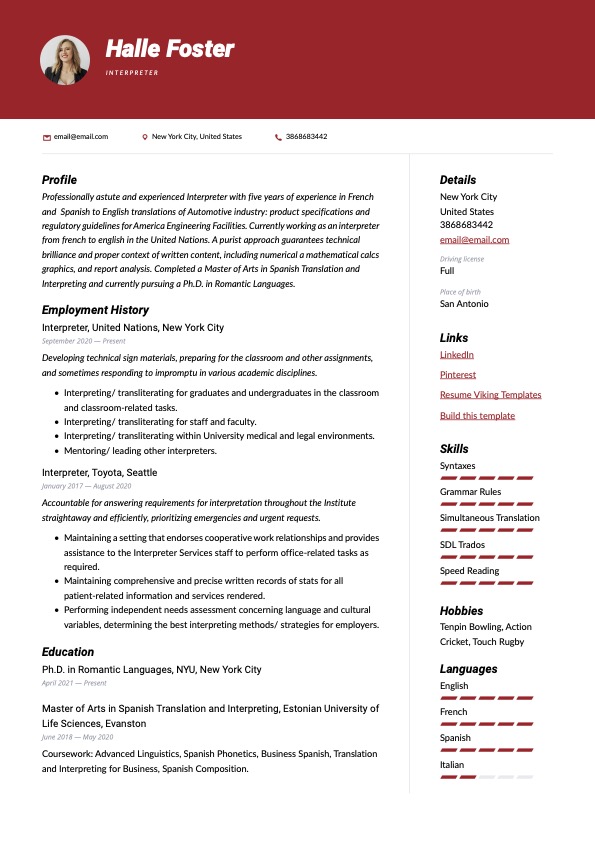

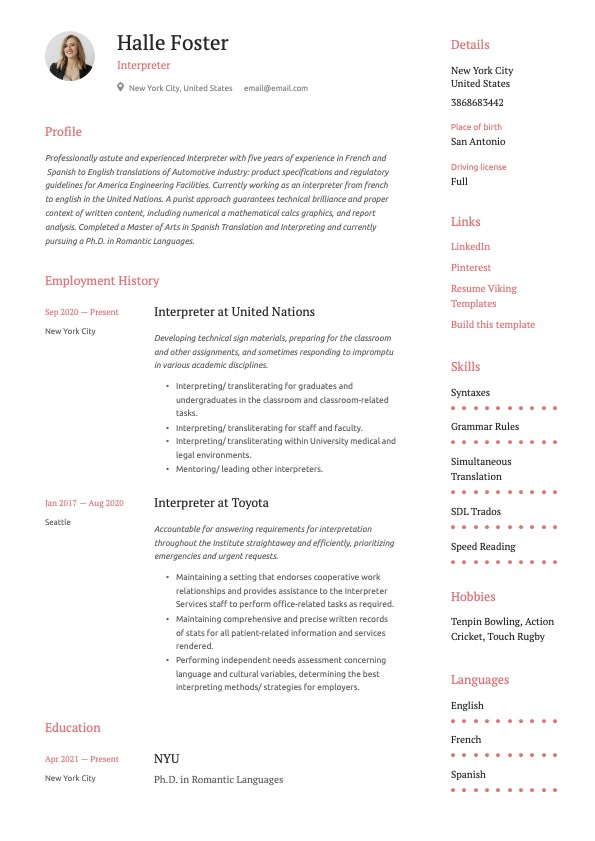
Professional information on Interpreters
Sectors: Professional, Corporate, Service, Educational
Career Type: Content Writing, Text Conversion, Editing, Proofreading, Editing, Linguistics, Translation
Person type: Interpreter, Terminologist, Foreign Scripter, Linguist Localizer, Reviser
Education levels: Associate’s Degree, Bachelors’ Degree, Master’s Degree, Doctorate Degree
Salary indication: $46 068 (Indeed)
Labor market: Estimated 19% growth projected between 2018 – 2028 (BLS) Organizations: Schools, Municipalities, Courts, Private Companies, Public Companies, Conference Centers, Freelance, Consultancies, Language Centers, Government, Universities, Colleges, Hospitals
